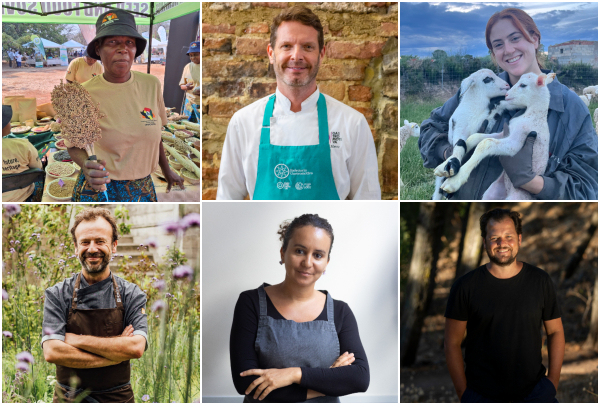News
Madrid Fusión Dreams Asturias will transform Gijón into the future capital of food.

On October 28, La Laboral Ciudad de la Cultura (Gijón/Xixon) will bring together international leaders to reflect on the challenges facing the planet in terms of sustainable food production in a context of overexploited resources.
On 28 October, La Laboral Ciudad de la Cultura in Gijón/Xixón will host the Madrid Fusión Dreams Asturias international conference. This event is designed to explore the great unknowns about the future of food and gastronomy. This influential summit will raise essential questions: What is happening? Where are we going? How do we get there? What role does gastronomy have to play on a planet facing the challenge of feeding itself sustainably in a context of overexploited resources?
The conference will bring together world leaders from various fields, including haute cuisine, agriculture, technological innovation, social activism, and historical research, who will contribute their perspectives. Despite their diverse backgrounds, they all agree on one key idea: the need to rethink the global food system to make it fairer, more mindful and more regenerative.
Among the leading figures at this year's event will be David Hertz (Brazil), a Brazilian chef, social entrepreneur and young global leader of the World Economic Forum. He is also an ambassador for the UN Food Systems and the co-founder of Gastromotiva, the Social Gastronomy Movement and Refettorio Gastromotiva. Also attending will be Elizabeth Mpofu (Zimbabwe), a global peasant leader in the fight for food sovereignty and rural women's rights.
Luis Alberto Lera (Lera, Castroverde de Campos, Zamora) and Nacho Manzano (Casa Marcial, Arriondas, Asturias) will participate in a roundtable discussion entitled 'Retrogastronomy: Looking to the Past to Save the Future'. The chefs will reflect on how reviving traditional techniques and knowledge can be used to address current challenges. Manzano, who has three Michelin stars and reinterprets Asturian tradition in his cuisine, and Lera, who is a world reference in game and cuisine linked to the memory of Tierra de Campos, will engage in a dialogue about territory, roots and the future.
Another round table, ‘Regenerative cuisine: recipes that heal the landscape’, will explore the regeneration of the landscape and the healing role of cuisine. It will feature Vicent Guimerà (L'Antic Molí, Ulldecona, Tarragona) and João Rodrigues (Canalha, Lisbon, Portugal). Guimerà, a Michelin-starred chef and member of the Slow Food movement, has developed a project with small producers to revitalise the Ebro Delta. Rodrigues, creator of the Materia Project, has established a network of farmers, fishermen and artisans to promote Portuguese gastronomic identity. Together, they will propose a future in which cooking is an act of environmental and cultural restoration.
The conference will also explore culinary memory in the discussion ‘The relevance of traditional recipes in the food tech era’, featuring Rosa Tovar, a writer and gastronomic researcher; Charo Carmona of Arte de Cozina in Antequera, Málaga, who has rescued almost forgotten Andalusian cuisine; and María Busta of Casa Eutimio in Lastres, Asturias, a cook and defender of authentic Asturian cuisine. Together, they will demonstrate how inherited recipes remain fundamental, even in an age dominated by technological innovation, because they form the basis of our cultural and gastronomic identity.
The debate will conclude with a contribution from Elena Burillo, a young agro-influencer from Zaragoza who has raised the profile of rural life through social media. This Aragonese farmer and livestock breeder has achieved the seemingly impossible by engaging thousands of people every day with stories about her flock and proudly showcasing life in the countryside, thus becoming one of the most recognised voices in agriculture on social media. Also featuring is Núria Madeo (Girona) a leading figure in regenerative agriculture. After attending many courses and conducting numerous trials, this agricultural engineer and her husband, Francesc Font, decided to take the plunge into regenerative agriculture on their family farm — and they have been successful. Together with their children, they travelled to Australia to meet Darren Doherty, the world leader in regenerative agriculture, and work on working farms to absorb all the knowledge they could. Twelve years ago, they abandoned the conventional model and started working without chemicals or external aids, taking significant risks. Today, their soil is more fertile and their environment is more vibrant. This year, they received the BBVA Award for Best Sustainable Producer 2025 for their extra virgin olive oil. Over the years, they have developed their own methodology and share it with other farmers.
Other notable speakers include Mercedes Iborra (Valencia), a pioneering entrepreneur in the digitalisation of agriculture. She is recognised as one of the most creative women in business for her company's transformative impact on the agri-food sector, as well as for her commitment to sustainable innovation. Also speaking will be Zineb Hattab (KLE, Zurich, Switzerland), the first chef to receive a Michelin star for a vegan restaurant in Switzerland. She will demonstrate how plant-based cuisine is establishing itself as an ethical, sustainable, and creative alternative. Juan Francisco Delgado, Vice-President of the European Foundation for Innovation, will present the opportunities offered by technological disruption and AI in the agrifood sector alongside Macarena Rodríguez, a Chilean engineer and Director of International Development at DAFF. DAFF is a pioneering company in technological innovation in food, offering ready-to-eat food solutions with a shelf life of between two and four years that do not require refrigeration. This has enabled DAFF to operate in diverse fields such as mining, humanitarian emergencies, the military and outdoor activities.
Bringing together this diversity of voices, Dreams Asturias 2025 is a unique forum where tradition and the avant-garde, technological innovation and cultural memory, social activism and haute cuisine converge. It is a space where gastronomy is not only conceived as art and pleasure, but also as a tool to regenerate territories, transform communities, and address the challenges faced by our planet in terms of how it feeds itself. On 28 October, Gijón will become the world capital of the future of gastronomy.
